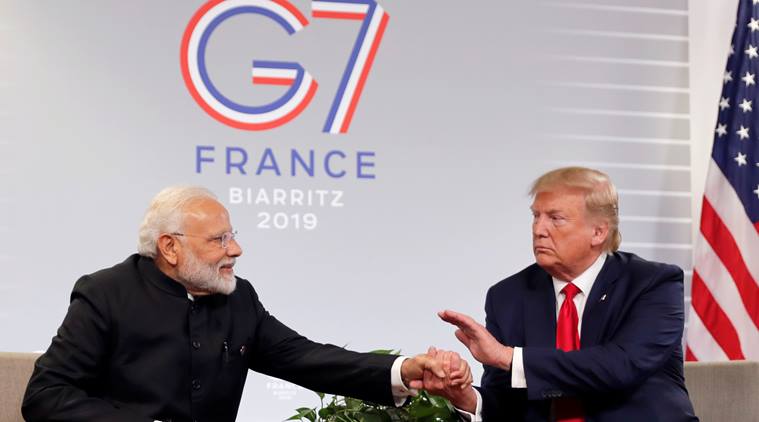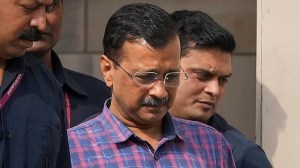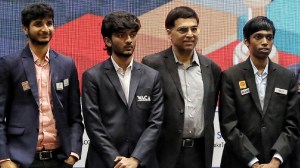- India
- International
Raja Mandala: Kashmir is not making world leaders lose sleep
Barring China, few major powers want to take advantage of India’s problems in Kashmir. Pakistan might whip itself into a frenzy about every word on Kashmir, but there is little reason for Delhi to be too excited
 US President Donald Trump meets Indian Prime Minister Narendra Modi for bilateral talks during the G7 summit in Biarritz, France. (Reuters)
US President Donald Trump meets Indian Prime Minister Narendra Modi for bilateral talks during the G7 summit in Biarritz, France. (Reuters)
As Prime Minister Narendra Modi wraps up his participation in the G-7 Summit in France, the immediate focus might well be about what US President Donald Trump said or did not say about “mediating” between India and Pakistan on Kashmir.
But the longer term question in Delhi ought to be about India’s problems and possibilities in a turbulent world that is marked not only by deepening economic conflict among the major powers but also sharpening political divisions within the West.
India’s challenge today is less about keeping the world at bay in Kashmir, but responding purposefully to the breakdown of the current global order and contribute to the shaping a new one.
To be sure, India has a problem in Kashmir — of reworking the political compact with the people of the Valley and generating sustainable support for the new constitutional arrangement. That task is certainly complicated by Pakistan’s furious bid to internationalise the issue.
But, Kashmir is not making world leaders lose sleep. Barring China, few major powers want to take advantage of India’s problems in Kashmir. Pakistan might whip itself into a frenzy about every word on Kashmir dripping out from the world’s chancelleries. But, there is little reason for Delhi to be too excited. After all, the world has other problems at hand.

Take a look at the just concluded G-7 summit. One surprising visitor to the summit venue was the Iranian foreign minister Jawad Zarif. The French President Emmanuel Macron, observers believe, was trying his hand at “mediating” between Trump and the Islamic Republic. Quite clearly, the world has more mediations to work with than Kashmir.
Besides Iran, G-7 is worrying about a lot of other issues — from the Amazon forest fires to Brexit and the escalating tariff war between the US and China, to the French threat to impose new taxes on American technology companies.
Kashmir might certainly be there if the situation in the Valley gets out of hand and the military tension between India and Pakistan escalates. Indian diplomacy has handled these situations again and again over the last three decades. While India needs to watch out, there is no reason to be overanxious.
If Delhi is smart, it will recognise that Trump values a trade deal with India a lot more than winning the Nobel Prize for solving the Kashmir problem.
In any case, India should worry less about what Trump might say about Kashmir, and pay more attention to his breath-taking disruption of the current global economic and political order. For more than seven decades, the idea of a coherent political West, championing global capitalism, security alliances, and multilateral institutions has been been an unshakeable assumption.
In the seven decades following the Second World War, “Western primacy” was seen as immutable. Communists, socialists, nativists and nationalists in the East and the South seemed to agree; they demonised the West and railed against its hegemony.
Few would have expected that the “leader of the Free World” — the US President — would be the one taking the political axe to the West and its core institutions.
Consider what Trump has done to the G-7 forum that was founded in the 1970s as some kind of “Politburo” to orchestrate political and economic coordination between the Western powers. At the first G-7 Summit that Trump attended in the summer of 2017, he announced the withdrawal from the 2015 Paris accord on the mitigation of climate change.
Last year, Trump left the meeting in Canada before it came to a close and dissociated himself from the final communique and damned his host Prime Minister Justin Trudeau as “dishonest”. This year, President Macron was smart enough to dispense with the joint communique.
Trump has been ever harsher with the World Trade Organisation that was designed by the West to advance globalising capitalism. Trump believes the WTO has not worked for the American labour. He is ready to bring the global trading architecture down in favour of bilateral deals.
Trump appears to be set on undermining US military alliances in Europe and Asia — a prospect that Russia’s Vladimir Putin and China’s Xi Jinping could only have dreamt of. He is also eager to end America’s “endless wars” in the greater Middle East, including Afghanistan.
We do not know whether Trump will be recalled as a short-term aberration or the accidental catalyst for big structural changes in the world. What we do know is that the post-War economic and political institutions are under extraordinary stress. Few of them are likely to survive the next few years intact.
The Trump disruption demands that India take a fresh look at its economic and security policies and adapt to structural changes in the global order, far more sweeping than the ones India confronted at the turn of the 1990s — the collapse of the Soviet Union, the end of the Cold War and the new wave of economic globalisation.
India’s strategy of incremental reform is increasingly incapable of coping with the disruptions unfolding in the world. The longer India takes to rework its internal and external economic strategies, the harder it will be to cope with the emerging global political challenges.
But an India that quickly adapts to the new dynamic can easily elevate its place in the new global pecking order that is bound to emerge when the dust settles from the current world turmoil. If India gets its economic house in order and returns to a high growth path, Delhi might discover that there was no better time than now to change the rules of the game on Kashmir as well as on the two state parties to the problem — Pakistan and China.
The writer is Director, Institute of South Asian Studies, National University of Singapore and contributing editor on international affairs for The Indian Express.
The column appeared in print under the headline ‘Beyond Kashmir’
EXPRESS OPINION
Best of Express

More Explained
Apr 23: Latest News
- 01
- 02
- 03
- 04
- 05








































